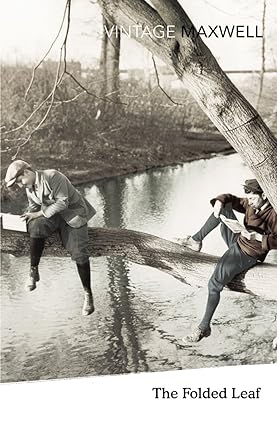The world in The Folded Leaf by William Maxwell is of another age when childhood lasted longer than it does now. Teenage boys wear breeches, naked youths jump into a pool at a school swimming lesson and teachers call their pupils Mister in this story of male friendship in 1920s mid-America.  The storytelling is easy, languid, introducing us to two boys. Lymie Peters, skinny, clever, on the edge of things and living with his absent widowed father. Newcomer Spud Latham, strong, angry, a boxer. Both dissatisfied with their lives. Their unlikely friendship grows from the late school years to college in Indiana, through fighting, bullying and a rather barbaric initiation by humiliation into a school fraternity, to discovering girls. Today the boys’ friendship may be viewed through a same-sex lens but there seems a group acceptance of ambiguity in this male group where girls are admitted infrequently to the fraternity’s grotty basement apartment where they take it in turns to dance to the shaky sounds of the victrola. It is a group innocence that feels rather alien today. This balance is upset when Sally enters their lives.
The storytelling is easy, languid, introducing us to two boys. Lymie Peters, skinny, clever, on the edge of things and living with his absent widowed father. Newcomer Spud Latham, strong, angry, a boxer. Both dissatisfied with their lives. Their unlikely friendship grows from the late school years to college in Indiana, through fighting, bullying and a rather barbaric initiation by humiliation into a school fraternity, to discovering girls. Today the boys’ friendship may be viewed through a same-sex lens but there seems a group acceptance of ambiguity in this male group where girls are admitted infrequently to the fraternity’s grotty basement apartment where they take it in turns to dance to the shaky sounds of the victrola. It is a group innocence that feels rather alien today. This balance is upset when Sally enters their lives.
Maxwell’s prose is a delight, so simple, never over-stating, building slowly. First published in 1945, The Folded Leaf is Maxwell’s third novel. He was fiction editor at The New Yorker for 39 years, working with writers including Nabokov, Updike, Cheever and Salinger. A story set in the last century but still familiar today.
The Folded Leaf is a story of youthful shyness and arrogance, mis-communications, silence and assumptions, and what can happen when feelings are unexpressed. A thoughtful read that stays with you.
CLICK HERE TO READ MORE ABOUT THIS BOOK AT AMAZON
See my reviews of other novels by William Maxwell:-
BRIGHT CENTER OF HEAVEN
THEY CAME LIKE SWALLOWS
TIME WILL DARKEN IT
And read the first paragraph of TIME WILL DARKEN IT.
If you like this, try:-
‘The Goldfinch’ by Donna Tartt
‘Brooklyn’ by Colm Tóibín
‘Some Luck’ by Jane Smiley #1LastHundredYears
And if you’d like to tweet a link to THIS post, here’s my suggested tweet:
#BookReview THE FOLDED LEAF by William Maxwell https://wp.me/p2ZHJe-7c6 via @SandraDanby




